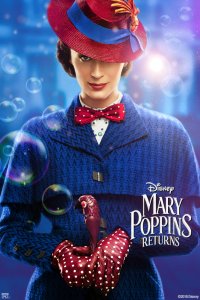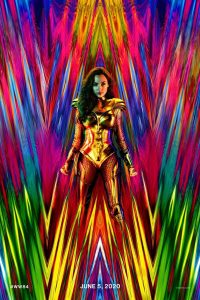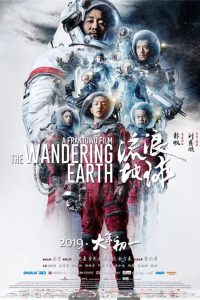Don’t Look Up: Josh Pearce and Arley Sorg Discuss Nope
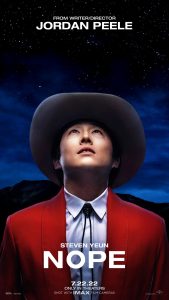 When was the last time we had a properly decent UFO movie? Was it The X-Files movie from 1998? Close Encounters of the Third Kind? All the way back to 1953’s The War of the Worlds? It’s hard to imagine anyone coming up with a fresh take on such an old trope,* but in keeping with his work on Get Out, Us, and even The Twilight Zone, Jordan Peele has taken pulp-scifi-horror and made something quite unique with his latest film, Nope.
When was the last time we had a properly decent UFO movie? Was it The X-Files movie from 1998? Close Encounters of the Third Kind? All the way back to 1953’s The War of the Worlds? It’s hard to imagine anyone coming up with a fresh take on such an old trope,* but in keeping with his work on Get Out, Us, and even The Twilight Zone, Jordan Peele has taken pulp-scifi-horror and made something quite unique with his latest film, Nope.
After the mysterious death of their father, OJ and Em Haywood (Daniel Kaluuya and Keke Palmer) struggle to keep their California horse ranch afloat by training animals for film and television and, when that doesn’t go well, selling off horses to neighboring theme park, Jupiter’s Claim, owned by former child actor Ricky “Jupe” Park (Steven Yeun). Jupe acted in a ’90s sitcom alongside a chimpanzee named Gordy, until one day Gordy went apeshit and ate the face off their costar.
A series of strange sightings and encounters at their ranch convince the Haywoods that they’re being visited by a UFO. Hoping to cash in on this, they enlist the help of a Fry’s Electronics technician named Angel Torres (Brandon Perea) and documentary cinematographer Antlers Holst (Michael Wincott) to capture the phenomenon on camera.
(A few spoilers ahead, but we’ve left plenty of surprises for those who haven’t seen the movie yet.)
Arley: Kenya Barris has an episode of #blackAF where he is tapped to talk about a Black filmmaker’s latest effort, only to discover that he really doesn’t like the piece, and the desire to support Black creators is suddenly in conflict with the idea of being honest and forthright. I can somewhat relate. Being a big fan of Peele’s movies (and of course TV show Key and Peele) and feeling like they did incredible things, this one was a bit disappointing. I found it to be kind of boring. The idea was cool, but it could have been flash fiction instead of a novella, let’s put it that way.
Josh: I can see why you had that reaction. It was nothing like his other films, which were doing more apparent social commentary. So people come out of Nope thinking, “What’s the message?” Obviously, it’s, “Don’t throw a plastic bag in the ocean, or jellyfish will choke on it.” I was actually really enjoying it because it’s a stripped-down, solid, scifi-monster movie, which really might be the genre I like the most. It’s rare to find a good monster movie these days.
One clear influence on Nope (and on Peele in general: recall Jason’s t-shirt in Us) is Jaws. The UFO, matte gray like sharkskin, moves among and behind the clouds like a fish hiding beneath the surface of the water. At one point, a long streamer gets tangled up in said UFO so that, even when the bulk of it is concealed, you can track its location by the dangling string of flags — an inverse of the empty barrels that announce the shark’s presence in Spielberg’s film.
It’s a simple, classic horror technique — build a sense of dread by hinting at the monster without fully showing it. There’s a moment in the previews for Nope where it seems the game is given away, that too much is revealed and has spoiled the suspense. That the monster was displayed too early, and all the mystery has gone away. But was it actually ruined by the previews? Nope. By the time we first see undeniable evidence of alien life, we’ve only just begun to tumble down the rabbit hole.
Josh: The creature design reminded me of Arrival. I liked the starkness of it. It looked amazing.
Arley: Yeah, I enjoyed the creature and its transformations, and I did like the skillful reveal of details throughout the narrative. You never learn too much; you never really know where this thing is from. You never really know what the fuck is going on. I enjoyed that because that’s more real to me. Like, shit happens and sometimes you don’t know why.
Josh: Here we have a UFO movie that’s being treated as a slasher movie. This thing is stalking you, picking off people. Like the Tom Cruise War of the Worlds. You have to hide in the house, everyone’s ducking under the table. That one guy grabbed a knife, as if that would do any good.
Arley: But real though, because when you’re scared shitless, what else can you do?
Josh: Yeah, do whatever you can. It’s slasher logic. Oh, no, there’s someone trying to get me, I’m gonna grab a coat hanger, and like poke his eye or something. You said you were getting bored with the pacing — I don’t know if it was slow in some places, or if it was because, for example, during the blood rain, OJ is stuck in the truck and he can’t see what’s happening in the house, and at that point in a horror movie I would expect them to drop the curtain of rain, and everything would be clear, and you have like a moment to breathe. A false sense of safety. A time for the characters to reset before the horror starts again. But this felt like an omnipresent horror, because the creature was always around, and that can get emotionally exhausting.
Arley: That could be part of it. Maybe I just grew numb to the threat. If you talk about Terminator as an ever-present threat, for example, and think about escalation, what happens is the robot keeps getting closer as the movie goes along, and its skin is coming off so the sense of menacing is amping up while it’s also continually gaining on Sarah Connor. Part of it here might be that you don’t have the sense of the creature gaining on them, per se. It’s just always, you know, more or less in the same spot. The feeling might be that there’s no escalation, and so you get numb to it, or at least I did.
Josh: Yeah, the pacing is not typical. It was a slow burn, with flashbacks to this horrific situation. I can see how that could be tedious or feel like drudgery to go through all those steps to get to a resolution. Then there was the scene where OJ saw the little aliens around the stables. At that point I thought we were about to get into M. Night Shyamalan Signs territory, where you can’t pull this off without it looking goofy. But then, thank god, it’s a fake out, and also he punched a kid in the face, ha!
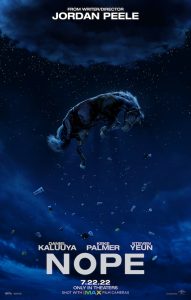 In addition to its drive-in theater subject matter, Nope has a throwback feel in its cinematography, shot on Kodak film by director of photography Hoyte Van Hoytema (Tenet, Interstellar, Ad Astra, etc.) — and in its commentary on bygone filmmaking. OJ and Em claim lineage all the way back to Eadweard Muybridge’s Animal Locomotion, that the first person to appear in a motion picture was their ancestor. Their business is presented as the last of a dying breed, with live animals increasingly being replaced by CGI. And, because of the UFO’s effect on electronics, the gang is forced to use analog cameras, which makes Antlers Holst’s low-fi expertise indispensable.
In addition to its drive-in theater subject matter, Nope has a throwback feel in its cinematography, shot on Kodak film by director of photography Hoyte Van Hoytema (Tenet, Interstellar, Ad Astra, etc.) — and in its commentary on bygone filmmaking. OJ and Em claim lineage all the way back to Eadweard Muybridge’s Animal Locomotion, that the first person to appear in a motion picture was their ancestor. Their business is presented as the last of a dying breed, with live animals increasingly being replaced by CGI. And, because of the UFO’s effect on electronics, the gang is forced to use analog cameras, which makes Antlers Holst’s low-fi expertise indispensable.
The overall effect is a touch of Once Upon a Time in Hollywood, a director with a meta-message regarding the current state of their artform, though arguably Peele’s theme is less adulatory and more critical than Tarantino’s fetishization of film-as-art.
Arley: I mean, Peele is still doing important things here that a lot of people who aren’t marginalized probably just don’t get, from story and character choices to the way the characters are lit vis-a-vis skin tone. My sense of disappointment might come down to expectations. I feel like you need to expect something on the artsy side, a literary scifi movie, because I think that is how you get through the pacing, and a lot of the narrative choices. If you’re involved with the beauty of the shots and the montages and the motifs and all that….
Josh: All the things you’re listing was what I was enjoying, so it pretty much landed for me. I remember watching the previews and the opening shots and being happy that Jordan Peele was making this movie because he is one of the few directors these days that I feel does cinematic stuff without having it be over the top. The protagonists aren’t soldiers or super scientists, they’re just regular people who happen to have a fucking alien on their ranch. They don’t have guns, they don’t build a laser to shoot it out of the sky, they use what’s available in their environment. And their problems were very real — financial problems. When OJ is figuring things out, you get a clear sense of his character. He’s observant, and better with animals than with people. Daniel Kaluuya was really good at communicating all that without hardly talking.
Arley: I really liked how they came up with their grand plan only to find out that homeboy had the same plan and this whole setup already, and that he already knows about the UFO. But everybody’s acting was on point. Steve Yuen, even though he’s a great actor, one of the major problems for me was his character arc.
Josh: Because it was truncated?
Arley: Yeah. On an emotional level, I just found it really unsatisfying. I was set up for there to be more to what happens with him. My favorite things were actually the stuff with the chimp and the shots of the kid (Jacob Kim). To me, that was the most brilliant filmmaking in the movie. So evocative, so visceral, so emotional. I could feel that kid’s terror. Not to mention the electrifying danger in the room, intensified by those incredible shots that leave so many questions. Fantastic tension.
Josh: I thought the chimpanzee scene was some of the most interesting stuff in the movie. Peele does that same cold open like he did in Us, where a scene is shown entirely out of context and you have no idea of its significance until much later in the film. It was really horrifying, but that whole setup, where it’s a TV set, makes it into a kind of absurdist horror. Reminds me of a David Foster Wallace story: “Little Expressionless Animals”, maybe, or “Westward the Course of Empire Takes Its Way”. Just that one subplot feels literary, like it could be a short story by itself.
Gordy’s rampage is filmed before a live audience. Nope opens with the first motion picture, framed by the alien’s digestive tract. A TMZ reporter begs OJ to film the UFO as it swallows him up, and Antlers Host films himself being eaten (and the camera being spat back out). One of the themes or social commentary in this movie is perhaps about how the camera chews you up and spits you out (in this case, literally). Everyone’s obsession with filming and being filmed, messages of child actor and animal performer exploitation in the entertainment business, and the cost of keeping us continuously diverted. As a recent CNN article quotes a former Amazon executive: “Video remains the most popular leisure activity in the world. Streaming may change, but consumers will adapt. They love video too much.”
You can’t take the brain-swapping in Get Out literally, nor see the millions of underground dwellers in Us as anything other than a metaphor, but the situation in Nope does lie within the realm of extreme plausibility. Despite it being about an alien, this may be Jordan Peele’s most grounded movie so far.
Arley: Enough people love this one that I think it’s worth watching and probably brilliant. There’s maybe a certain vibe to Peele’s previous flicks and you may be expecting that vibe. I think this is a change in vibe. Which is good: filmmakers don’t have to stick to one thing. Go with an open mind and enjoy it on its own terms.
*Josh: How could we forget to mention The Vast of Night? That’s a fantastic UFO movie! Go watch that, too.
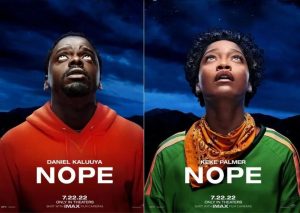
Written and directed by: Jordan Peele
Starring: Daniel Kaluuya, Keke Palmer, Brandon Perea, Michael Wincott, Steven Yeun, Wrenn Schmidt & Keith David

ARLEY SORG, Senior Editor, has been part of the Locus crew since 2014. Arley is a 2022 Kate Wilhelm Solstice Award recipient. He is also a 2021 and 2022 World Fantasy Award finalist as well as a 2022 Locus Award finalist for his work as co-Editor-in-Chief at Fantasy Magazine. He is a 2022 Ignyte Award finalist in two categories: for his work as a critic, and for his essay “What You Might Have Missed” in Uncanny Magazine. Arley is Associate Editor and reviewer at Lightspeed & Nightmare magazines, columnist for The Magazine of Fantasy and Science Fiction, and interviewer at Clarkesworld Magazine. He grew up in England, Hawaii, and Colorado, and lives in the SF Bay Area. A 2014 Odyssey Writing Workshop graduate, he can be found at arleysorg.com – where he has started his own “casual interview” series with authors and editors – and on Twitter (@arleysorg).
JOSH PEARCE has stories and poetry in Analog, Asimov’s, Beneath Ceaseless Skies, Cast of Wonders, Clarkesworld, IGMS, Nature, and more. Find him on Twitter: @fictionaljosh, or at fictionaljosh.com. One time, Ken Jennings signed his chest.
 While you are here, please take a moment to support Locus with a one-time or recurring donation. We rely on reader donations to keep the magazine and site going, and would like to keep the site paywall free, but WE NEED YOUR FINANCIAL SUPPORT to continue quality coverage of the science fiction and fantasy field.
While you are here, please take a moment to support Locus with a one-time or recurring donation. We rely on reader donations to keep the magazine and site going, and would like to keep the site paywall free, but WE NEED YOUR FINANCIAL SUPPORT to continue quality coverage of the science fiction and fantasy field.
©Locus Magazine. Copyrighted material may not be republished without permission of LSFF.





